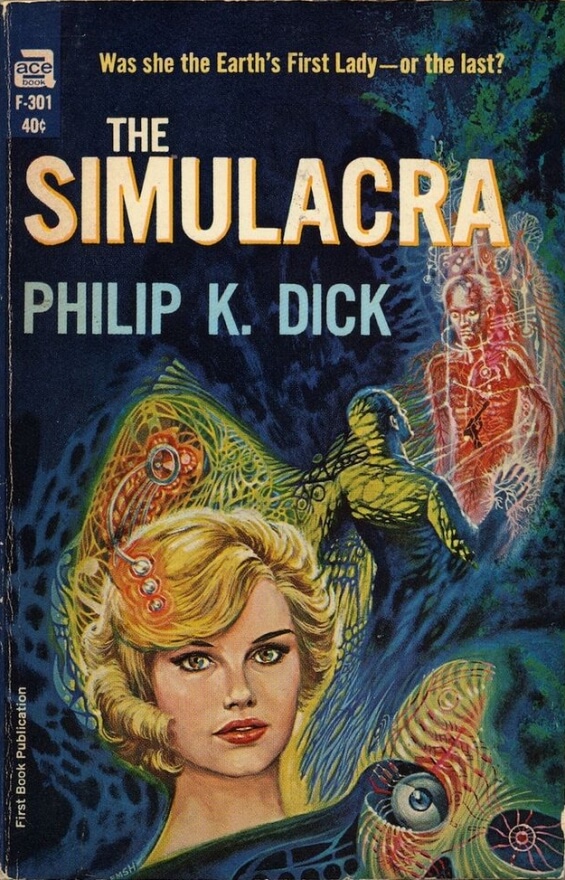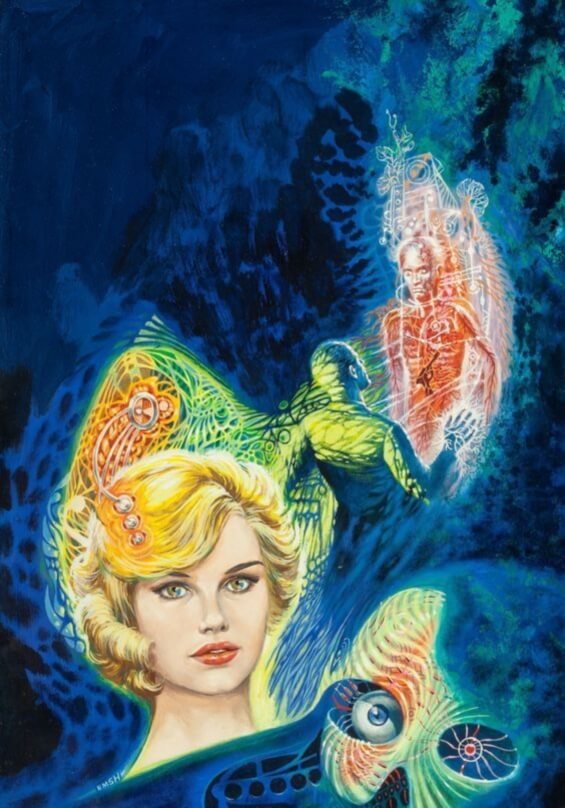
 Reading, Short And Deep #006
Reading, Short And Deep #006
Eric S. Rabkin and Jesse Willis discuss Friend Island by Francis Stevens
Friend Island was first published in All-Story Weekly, September 7, 1918.
Here’s a link to the PDF of the story.
Posted by Scott D. Danielson

 Reading, Short And Deep #006
Reading, Short And Deep #006
Eric S. Rabkin and Jesse Willis discuss Friend Island by Francis Stevens
Friend Island was first published in All-Story Weekly, September 7, 1918.
Here’s a link to the PDF of the story.
Posted by Scott D. Danielson

Here’s an interesting lecture, by Simon J. James, about H.G. Wells’ The First Men In The Moon recorded August 30, 2013.
Note that the audio for the video cuts-out for about 3 minutes starting at the 17 minute mark.
Posted by Jesse Willis

 Roadside Picnic
Roadside Picnic
By Arkady and Boris Strugatsky; Translated by Olena Bormashenko; Read by Robert Forster
7 hours 8 Minutes [UNABRIDGED]
Publisher: Random House Audio
Release Date: October 2, 2012
Eastern European Science Fiction has not been on my RADAR for decades. Of course, it would be easy to blame the Anglo-American dominance in the genre for this, but another reason might have been the ill-timing of my first touchpoints with SF from what was then still (even though barely) the Soviet Union. As a kid, I got a box of books from the German Democratic Republic with Soviet and other Eastern Bloc Science Fiction stories (Utopian Novels they were called to avoid the Anglicism). I read one of them and browsed a few others. Suffice to say, that I was not impressed. Blame my immature literary taste buds, but to me, they seemed overly intellectual, a bit cumbersome, boring. After that I hardly touched any book that came from beyond the Iron Curtain, with few exceptions. What an idiot I had been! A recent trip to Moscow sparked my interest in Russian culture, so I thought, what the heck. Gimme some of those Strugatsky brothers that everyone is going on about. Luckily, there has been a fairly recent re-release of the brothers’ Arkady and Boris Strugatsky most famous work Roadside Picnic. Published in 2012, it not only has been newly translated but it is also based on a restored version of the text prepared by Boris Strugatsky (Arkady having passed away in 1991) to repair the damage that was done to the book by Soviet censorship, including all of the filthy language. It is a testament to the brilliance of the novel that even in its crippled version it was nominated for a John W. Campbell Award in 1978 and came second, a rare occurrence for a foreign-language book.
What’s it about then? It’s a First Contact story, with a clever twist. It’s about alien contact alright, but without the aliens. At some point in time, Earth was visited by alien beings, who settled at six different locations around the globe. The result was disastrous with weird phenomena wreaking havoc among the human settlements that were affected. However, this was no attack, no attempt at invading Earth. In fact, no one ever got to see the aliens. There was no attempt at communication and no intention to stay by the visitors. After a while they just left, leaving behind so-called “zones”, in which marvelous artefacts could be found; some completely baffling, others very useful and thus quickly becoming coveted contraband. The problem is that getting these artefacts is highly dangerous. The laws of physics as we know them do not seem to apply in the zones and there is a plethora of hidden traps for unwary explorers. Because of the dangers and study the valuable artefacts (which stubbornly defy any attempt to fully comprehend them), an international research institute has been created which cordons off the zones and occasionally sends in expeditions to collect specimens for examination. Apart from the sanctioned officials there are illegal treasure hunters, called Stalkers, who risk their lives for the high profits the items from the zone yield on the black market.
The story is based around one of the visitation zones, near a small town in Canada and is mainly told from the point of view of Redrick “Red” Schuhart. Red is a stalker, who at the beginning of the novel is employed by the Institute where is experience in the zone is needed when he accompanies a researcher into the zone. The expedition ends badly, Kirill, the Russian scientist has an accident and dies shortly after his return from the zone. This doesn’t stop Red from being a Stalker, and the further the novel progresses it becomes clear that although he doesn’t mind the money it is not his only reason to risk his live. The zone has become an obsession for Schuhard and nothing can keep him out. The novel follows Schuhart for eight years, in episodic chapters with a few changes in points of view but always coming back to him. He has good times and not-so-good, going in and out of jail, sometimes living the good life from the profits and sometimes worrying what will happen to his wife and kid when he’s in prison. In the meantime, life around the zone is changing, security is getting tighter, the government wants to re-settle all of the remaining population. No wonder considering that the dead are returning from their graves and reclaim their lives among their families and the children of frequent visitors to the zone are showing strange mutations. Life is getting harder for Stalkers, as not only does it get more and more difficult to get into the zone, but the amount of artefacts dwindles until only one big prize seems to be left. A golden orb that can grant its owner any wish – unless it really does come from the heart. This is what Redrick Schuhart is going for in the final chapter of the novel. But – what to wish for?
Schuhart reminds one of the tough, foul-mouthed, hard-drinking and chain-smoking protagonists of a Hard Boiled detective novel and to no small degree is it exactly that language and approach to the narrative that makes it so accessible. Yes, this book touches on some pretty philosophical topics – this is Literature with a capital L – but in the best tradition of the Science Fiction genre, it does so in wrapped in a damn good story. What can human being ultimately know? Could we really ever hope to communicate with an alien species or are we just like some frightened small animals coming out of hiding only after the picnic party has left and all that remains to do is to fight for the scraps they left behind? The narrator, Robert Forster, does a fine job indeed, breathing life to Redrick Schuhart, both when he’s being a cynical bastard and when he’s ridden by doubt and despair. One could not have wished for a better narrator for the audio book.
The recording concludes with a very interesting afterword by Boris Strugatsky about the long and complicated history of getting the book through the Kafkaesque maze of censorship and bureaucracy that was the Soviet publishing industry. The foreword by Ursula K. LeGuin that is included in print version is missing from the audio but that’s about the only desideratum of an otherwise brilliant production. Highly recommended!
Posted by Carsten Schmitt

 Reading, Short And Deep #004
Reading, Short And Deep #004
Eric S. Rabkin and Jesse Willis discuss The Words Of Guru by C.M. Kornbluth
The Words Of Guru was first published in Avon Fantasy Reader, No. 5, 1947.
Here’s a link to the PDF of the story.
Posted by Scott D. Danielson

 The SFFaudio Podcast #358 – Jesse, Paul, and Marissa talk about The Simulacra by Philip K. Dick.
The SFFaudio Podcast #358 – Jesse, Paul, and Marissa talk about The Simulacra by Philip K. Dick.
Talked about on today’s show:
1964, Simulacrum vs. Simulacra, Dick is right in complaining about the title, Ace Books, what this book is about, “The First Lady Of The United States”, in the background, a tiny little hint, are chupas androids?, a closed-circuit-like passing spasm, who and what are robots, simulacrum, undercooked, best novel or worst novel, the audiobook, well-crafted, juggling, so confusing, a populated novel, psychoanalyzing Philip K. Dick, the settings, a complex complicated world, the Warsaw Pact, Poland, the Soviet Union, jalopies, why is the world the way it is?, der alter = the old man, Philip K. Dick saying…, my wife is my boss, changeable husbands, my emotions aren’t real, a fine idea for an SF novel, Queen Elizabeth II, the society is profoundly different, they don’t have books (or knowledge about anything), projecting into minds, your one chance, mass psychosis, societal control, a caste system, “the Ges”, the USEA society, education?, hobbies, “Let’s Watch Nichole”, it was nightmare world, passing the social studies test to keep your apartment, deep sea divers, knowing the numbers, a glimmering seed of an idea, revisionist history all the time, busywork, having political correct terms for everything, a Stalinist version of this story, the New Pravda, Wikipedia, “the euphemism treadmill”, what sounds like attack words, the word shit is a shitty word, toilet, escape to another planet, there’s always people going off-world, Do Androids Dream Of Electric Sheep?, when you leave Earth, service simulacra, a worker of your own to help you, a warm jacket and a packed lunch, quick divorce, “I divorced my wife last night”, the Frontier Thesis, Frederick Jackson Turner, space as the new frontier, “the artificial worlds of Philip K. Dick”, the default, “the final frontier”, colonizing the solar system and the universe, other countries, Canadian bacon exists, moving to another apartment complex is a huge deal, what will the kids think?, a satire, the latest season of Homeland, an unprecedented, American television is very strange, House Of Cards, has there ever been an American television series set in another country?, not a Netflix show, tricked Americans into seeing another country, increasing America, the Berlin Airlift, JFK, the Philippine conquest, and Cuba, Germanophile weirdness, time travel is very easy, why always with the Hermann Göring in SF?, “he looks like he’s having fun”, he knows how to use power, Caligula, monsters, you have to have dinner with someone in the Third Reich, To Your Scattered Bodies Go by Philip Jose Farmer, why is Hermann Göring in this book?, a transplanted plot?, looking to change time, palace intrigue, a time war, hilarious, more of everything, he’s running into himself, Sir Francis Drake, Time Pawn aka Dr. Futurity, apartment complexes, The Man Who Japed, fear of the pop-quiz, history isn’t neat, from democracy to totalitarian hermit kingdoms, baroque weird alien things (from the outside), it hangs itself (together), jug bands?, “Jug Band Plays The Whitehouse”, Richard Congrosian believes his body odor is lethal, Chick, chupa, the way Dick’s mind works, she’s so mean she can’t be a robot, that explains my lack of emotion, palupas are fake, am I invisible?, nits?, the crawling advertisements, they shoot the adveritzments to make them shut up, the reason Richard Congrosian thinks he stinks, I’ve had sex with 755 women, I’ve met three presidents of the United States, the default response, brainwashing, Jesse is sensitive to scent, Tide laundry detergent, gender equality vs. not touching door-handles, Paul’s superpower is he can smell ketchup from a mile away, Jesse thinks the general public is brainwashed by clothing cleaning products advertising, soap operas, Gain laundry detergent, advertising a product can create a market, fake creation of desire, the pets, my sheep’s not real, like the Dr. Bloodmoney, psychiatry, Mars, neanderthals, political factions, mutants, he just read something, The Crawlers, “more evolved” isn’t really a thing, a group of sad-sack mental deficients, what circumstances would allow you to enjoy a future that is grim?, he wanted vegetables and they gave him a coin, if they were the simulacra at the end, waiting for their time to rise up over the humans, the neanderthals will inherit the earth, this (novel) is a stew, not the best meal he (Dick) has served, electic music enterprise, do they have any ethnic music before you die?, funny digs, German conglomerates, Dick seemed to enjoy writing this, the next thing you know you have twenty characters and ten plots, it’s all held together by Dr. Egon Superb, Strikerock, Wilder Pembroke, National Police, one of his biographies or an interview, other than being a psychoanalysis of his own marriage, Dick never came at it from whatever the dominant view was, sometime in this period…, communists, the FBI came by and interviewed him, a locked filing cabinet, bikers, drug addicts, the FBI, or he did it, he became friends with one of the FBI agents (who taught Dick to drive), Donald A. Wollheim, in the paranoid phase, I’m gonna help out, no matter what novel there’s only thirty or forty people in the entire society, eventually their in the crank file, when you see the NP men, the Secret Service, an insight, when Philip K. Dick is at home he’s at work, all grist for his mill, when he isn’t writing novels he’s writing letters to the FBI, a terrible Philip K. Dick novel but a pretty good science fiction novel, fun and funny, a prism, that’s okay, sometimes you get stuff that’s okay, was there boobs?, “she had high-rise breasts”, 90-year old breasts, no quivering breasts, they were poking out every now and then, “her breasts protruded divinely”, we have marriage we have boobs, somebody is drinking coffee, you can see his life, so true, so familiar, just hanging out with Philip K. Dick again, random Germans, he likes Germans, hanging out with Philip K. Dick.



Posted by Jesse Willis

 Reading, Short And Deep #003
Reading, Short And Deep #003
Eric S. Rabkin and Jesse Willis discuss The Flowering Of The Strange Orchid by H.G. Wells
The Flowering Of The Strange Orchid was first published in the Pall Mall Budget, August 2, 1894.
Here’s a link to the PDF of the story (from Pearson’s Magazine, April 1905).
Posted by Scott D. Danielson